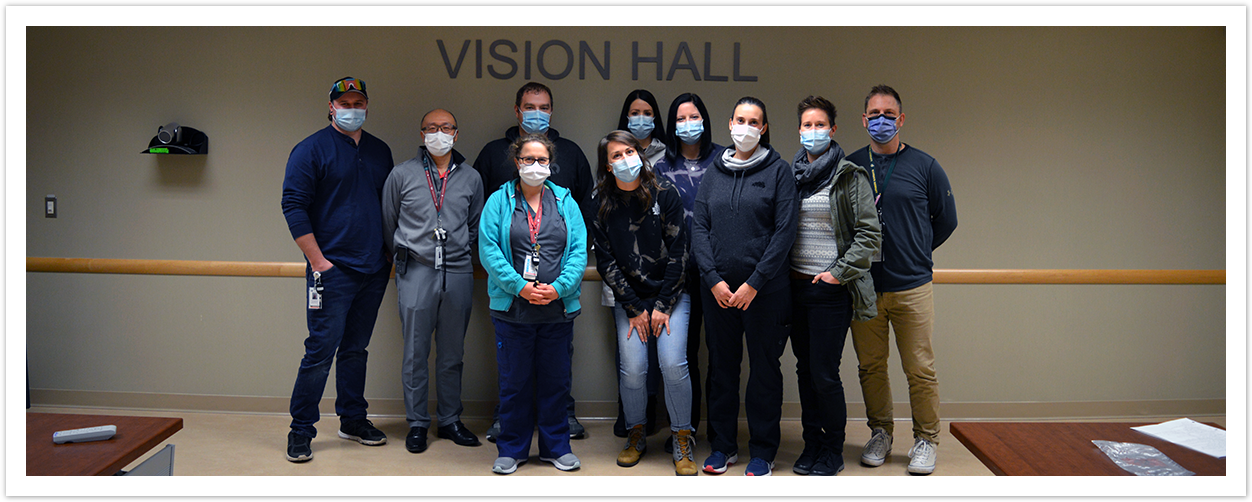Hours of Operation:
Monday to Friday from 8:00 am to 4:00 pm
Location:
The Diagnostic Imaging Cardio Respiratory reception area is on the main floor of Woodstock Hospital

Hours of Operation:
Monday to Friday from 8:00 am to 4:00 pm
Location:
The Diagnostic Imaging Cardio Respiratory reception area is on the main floor of Woodstock Hospital
Accessing this Service:
To obtain an appointment with Cardio Respiratory Services, a referral must be made through a physician and you may be required to bring in one of the following forms.
Click here to continue to our Forms page to obtain these forms.
The Cardiorespiratory Department is instrumental in assisting with the diagnosis and management of cardiopulmonary disorders. The department performs electrocardiograms, monitors for the investigation of cardiac irregularities, performs pulmonary function studies and also works in conjunction with Nuclear Medicine in the performance of Myocardial Perfusion Imaging (MIBI) heart studies.
Electrocardiogram (ECG)
An electrocardiogram (ECG) is a test that measures the electrical activity of the heart. It involves the placement of electrodes which are small adhesive patches or suction cups that are placed on your chest, arms and legs. There are sensor pads in these patches that record the electrical activity which is then interpreted by a physician.
Standard Exercise Stress Test (this can only be performed if you can walk on a treadmill)
A standard exercise stress test is a general screening tool used to evaluate the heart’s response to graded exercise. At predetermined intervals the exercise will increase and the patient’s ECG, blood pressure and heart rate are recorded. The results of the test may help your physician decide if you have heart disease and how severe it is.
Nuclear Stress Test (MIBI)
A nuclear stress test is an imaging test that shows how blood passes through the heart at rest and during exercise. A small amount of radioactive material called a tracer or radiotracer is used. This substance is given by IV. An imaging machine takes pictures of how the tracer moves through the hearts arteries and this helps find areas of poor blood flow or areas of the heart that are damaged.
Holter Monitor
Holter monitoring enables your physician to find out how well your heart is keeping its rhythm as you go about your day-to-day activities. Since the monitor continuously records your heart beat over the period of time you wear it, it is suggested that you bathe prior to your first exam visit, as depending on the duration of the holter monitor you may not be able to shower while wearing it. It records on a small digital recorder for subsequent review and analysis.
Pulmonary Diagnostic Services
A resting oxygen saturation (SpO2) is done with all ordered pulmonary diagnostic test.
Spirometry
Spirometry is a non-invasive pulmonary function test that will measure how much air you can breathe in and out of you lungs as well as how easily and fast you can force the air out of your lungs. This test is used to screen for diseases that affect the airways, helps to determine the need for further testing, and also to evaluate the effectiveness of a medication.
Full Pulmonary Function Test
A full or complete pulmonary function test is a non-invasive test that will provide the physician with a patient’s lung volumes, airway resistance, rates of flow, and gas exchange. This involves sitting inside our body-box where the patient will complete a series of guided breathing exercises. For one of the tests the door to the body-box is required to be closed, but it was designed with claustrophobia in mind.
Maximal Inspiratory Pressure (MIP) and Maximal Expiratory Pressure (MEP)
This test evaluate the strength of the muscles associated with breathing. The MIP is an indication of the strength of the diaphragm, and the MEP indicates the strength of the intercostal and abdominal muscles.
Arterial Blood Gas (ABG)
An arterial blood gas is a test that measures the amount of certain gases dissolved in the blood as well as other blood markers. This test requires that a small sample of blood be drawn from the radial artery in the wrist and can provide vital information for patients with respiratory diseases and helps to determine the need for home oxygen.
Exertional Hypoxemia Test (Home oxygen assessment)
This test may be ordered for someone who experiences severe breathlessness that limits their ability to exercise or perform their normal daily routine. It can be used to determine the need for home oxygen for patients who do not qualify by an ABG. It is conducted by monitoring oxygen levels during exertion and by measuring your shortness of breath during exertion.
Six Minute Walk Test
A six minute walk test measures the distance a patient can walk quickly on a flat hard surface for a period of six minutes. This is used as a measure of functional status or fitness and can help your doctor determine the need for more sophisticated testing.